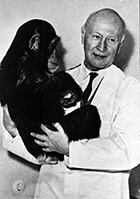Bernhard Rensch
| Bernhard Rensch | |
|---|---|

Bernhard Rensch
|
|
| Born | 21 January 1900 Thale |
| Died | 4 April 1990 (aged 90) |
| Nationality | German |
| Fields | Ornithology |
| Known for | Modern evolutionary synthesis |
| Notable awards | Darwin-Wallace Medal (Silver, 1958) |
Bernhard Rensch (21 January 1900 – 4 April 1990) was a German evolutionary biologist and ornithologist who did field work in Indonesia and India. He is probably best known as one of the architects of the modern evolutionary synthesis, which he popularised in Germany. Besides his work on how environmental factors influenced the evolution of geographically isolated populations and on evolution above the species level, which contributed to the modern synthesis, he also worked extensively in the area of animal behavior (ethology). His education and scientific work were interrupted by service in the German military during both World War I and World War II.
Rensch was born in Thale. He served in the German army from 1917–1920, and then continued his education. He received his Ph.D. from the University of Halle in 1922. He joined the zoological museum of the University of Berlin as an assistant in 1925. In 1927 he participated in a zoological expedition to the Sunda Islands. He studied the geographical distribution of subspecies of polytypic species and of complexes of closely related species with attention to how local environmental factors, especially climate, influenced their evolution. In 1929 he published the book Das Prinzip geographischer Rassenkreise und das Problem der Artbildung that discussed the relationship between geography and speciation. His work in this area would influence Ernst Mayr, who was also an assistant at the museum from 1927–1930, and would contribute to the development of the modern evolutionary synthesis. In 1937 he was forced to leave the museum because he refused to join the Nazi party, and took a position at a zoological garden in Münster. In 1940 he was recalled for military service, but was discharged for medical reasons in 1942.
...
Wikipedia
